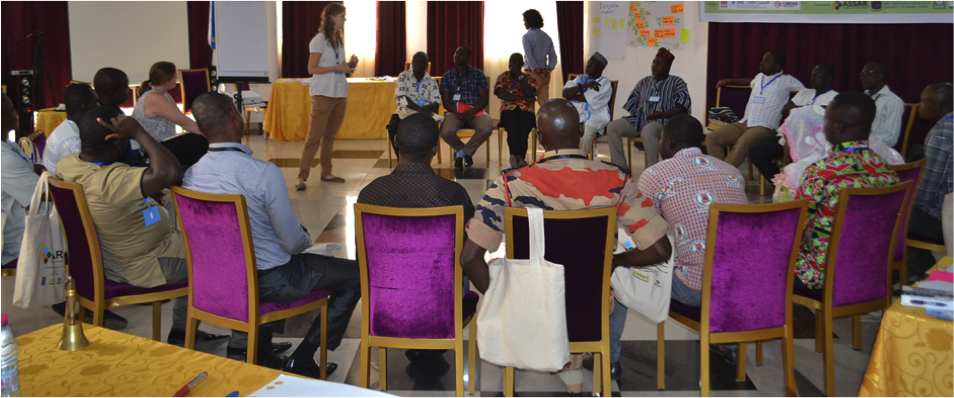
The second round of Transformative Scenario Planning (TSP) workshops were held near the end of 2016 in Ghana and Mali as part of the Adaptation at Scale in Semi-Arid Regions (ASSAR) project. These workshops built on a set of scenarios developed through a collaboration of ASSAR researchers and stakeholders from Upper West, Ghana and Koutiala, Mali. These scenarios facilitated participants to think critically about what the future may hold in terms of climate change, agriculture and food so that more legitimate actions can be designed and taken in the present.
In Ghana, the second workshop was held on November 2-3 at the Nouyong Empire Hotel in the city of Wa in the Upper West Region. Dinesh Budhram from Reos Partners and Margot Steenbergen from the Red Cross Red Crescent Climate Centre facilitated the workshop. Participants were reacquainted with the scenario stories that had been developed over the preceding months through use of a set of scenarios videos prepared by the ASSAR communications team. The facilitators then led participants through at process of critical thinking and collective visioning that ultimately resulted in a set of prioritized themes or action areas. These included 1) disaster risk management, 2) improved market systems, 3) ecosystem management, 4) sustainable food and livelihoods empowerment, 5) climate smart water resources management, 6) and dissemination of the group’s shared vision for Upper West region, termed “Vision 2035”, to larger audiences and integrating it with national policy documents. Action groups were formed around these key action areas by those participants interested in and committed to shaping these ideas further, and remaining in touch with the ASSAR team to carry forward.
In Mali, the 2nd TSP workshop was held on December 13-14, in Koutiala, Mali. There, participants from the Sikasso region along with two national level stakeholders worked to develop a common vision: “A l’horizon 2035, faire des investissements dans l’agriculture et la conservation des ressources naturelles afin de garantir la sécurité alimentaire et améliorer le revenu des ménages dans le cercle de Koutiala” – translated as: “By 2035, strategic investments will target agriculture and natural resource conservation to ensure food security and wellbeing in Koutiala Region”. Based on this common vision, the socio-cultural context of the Region was analyzed to identify existing opportunities and barriers. Three groups of stakeholders were formed: public workers; civil society and farmers (farmer organisations). Each group was asked to list relevant strategies for achieving the vision, and for each of those, resources needed; problem to be addressed; actors to engage, and short and long term actions neede. From their lists, participants prioritized the following strategies, 1) management of rainwater on farms, 2) improvement of soil fertility, 3) promotion of improved seeds, 4) promotion of good nutritional practices, 5) secure land tenure, 6) forest resource management, and 7) production and post-harvest management. The Mali team is now working with the stakeholders on ways to put these strategies into action.


